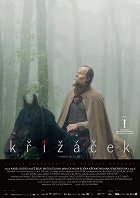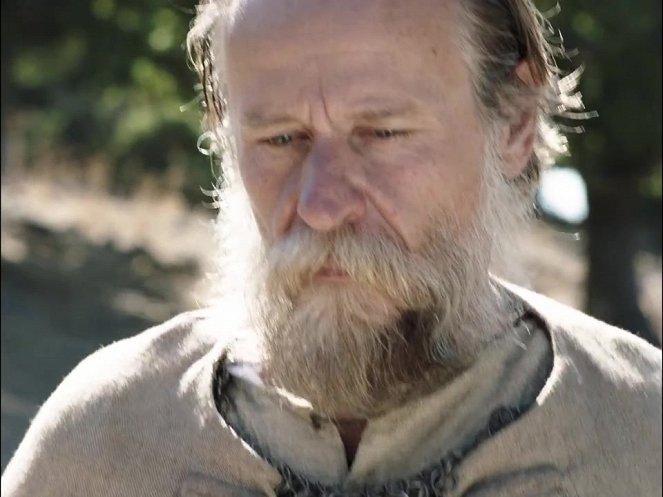Directed by:
Václav KadrnkaCinematography:
Jan Baset StřítežskýCast:
Karel Roden, Aleš Bílík, Matouš John, Jiří Soukup, Michal Legíň, Jana Oľhová, Ivan Krúpa, Eliška Křenková, Tomáš Bambušek, Petr Cemper, Václav Kadrnka (more)Plots(1)
The knight Bořek sets off on the trail of his missing son. Little Jan has run away from home, rushing after a dream, an illusion about the holy mission of children. His aging father searches for him in every possible way, trying to catch up with his son. But he arrives everywhere too late, finding only witnesses who say they have seen the boy. He manages to glean some scraps of information from them and tries to use them to piece together his son's fate. He even projects his lost son onto children he encounters on his journey. Gradually his image of the boy becomes more blurred; Bořek's state of mind starts to crumble and the landscape through which he travels ever onwards increasingly resembles his mental landscape. The only material evidence he finds are items associated with Jan: his little sword and christening coin. These are real clues but he is unable to assess them properly. In the end he is unable to distinguish between reality and a theatrical representation of the myth. (CinemArt)
(more)Videos (1)
Reviews (9)
In terms of being an attempt to make a meditative artistic film fresco, whose story is more of a parable about parental responsibility, Little Crusader is unprecedented in Czech film terms. As a film, however, it is only able grip the audience with its visuals, perhaps through the camera and Roden’s performance. He plays a character of a father looking for his son who loses his mind during the film, and that's about it. His simple, intellectually and desperately empty (content-wise) plot, inspired by an epic poem by Jaroslav Vrchlický, is so terribly stretched out and his scenes are so exaggeratedly long that it is simply impossible not to get bored. Extending a half-hour’s worth of material to three times the length is not a good idea, because film craft does not automatically consist of the ability of filmmakers to film the raising and lowering of a drawbridge so that it takes up three minutes in the film. Two thirds of the film consist of shots of a gloomy Roden riding a horse and the rest of children with palm branches. All that remains is the viewer's need to interpret what they see on the screen and look for different meanings. The dialogues are, of course, sparse, because this intimate crusader road-movie was supposed to mainly tell its story through pictures, but there is not much to tell.
()
The comparison of film to Plato’s Cave is quite fitting, but in the case of Little Crusader, it’s appropriate in the sense that the shadows come to life thanks to the fact that the audience itself is projected into them. Those who connect with their own parental anxieties at the beginning are ahead of the game. For others, the fundamental obstacle is the absolute vapidity of the characters and the lack of any tension that would spark viewers’ attention as in other, similarly stylised films. However, Kadrnka and co. placed in front of viewers several obstacles that can draw their interest to somewhere completely different. In practice, the film is rather more reminiscent of a happening, where it soon becomes more interesting and entertaining to not watch the screen, but to observe the screening room or try to tune in to the film and watch it only as a mechanical form. Little Crusader is not a flawless film, but it is good that it was made and that it got the grand prize at the Karlovy Vary International Film Festival. It invites us to recall the fundamental argument of the heated debates around genre production in Germany: Is it okay when ten imperfect genre films are made instead of a single excellent one? Yes, because cinema is not a collection of isolated exceptional works, but an entire interconnected world whose inhabitants stimulate each other.
()
An instance of cinematic poetry with a nice 4:3 composition (which keeps nothing but the essentials in the picture),
creative ideas on the part of the director (using the sound of a window banging shut) and an ambiguous conclusion that
lets the viewer think. Little Crusader has a slow and lengthy yet harmonious and compact narrative. It is a film made
exclusively for the most discerning viewers who are fans of Andrei Tarkovsky or Béla Tarr. P.S.: Why didn’t they choose to shoot in
black-and-white? Ordinary viewer will not watch this anyway and playing with light and shadows could have had a
greater impact on the target audience.
()
I am thrilled that such a treasure as Václav Kadrnka and his film Little Crusader can emerge in contemporary Czech cinema. It evokes to me the magnificent films of František Vláčil, which is also a way of expressing my conviction that in black and white this work would be almost perfect. (80%)
()
There was only one Vláčil, this doesn't even come close. It's not a pose to say that I really like slow-moving films with an emphasis on atmosphere, but this one wasn't atmospherically slow, just annoyingly slow, and in the first half it was visually like a production of the Brno Czech Television Studios, full of static declaiming dummies. Just the kind of post-revolutionary pseudo-art by a fresh FAMU graduate who thinks he’s the shit :o)
()



Ads